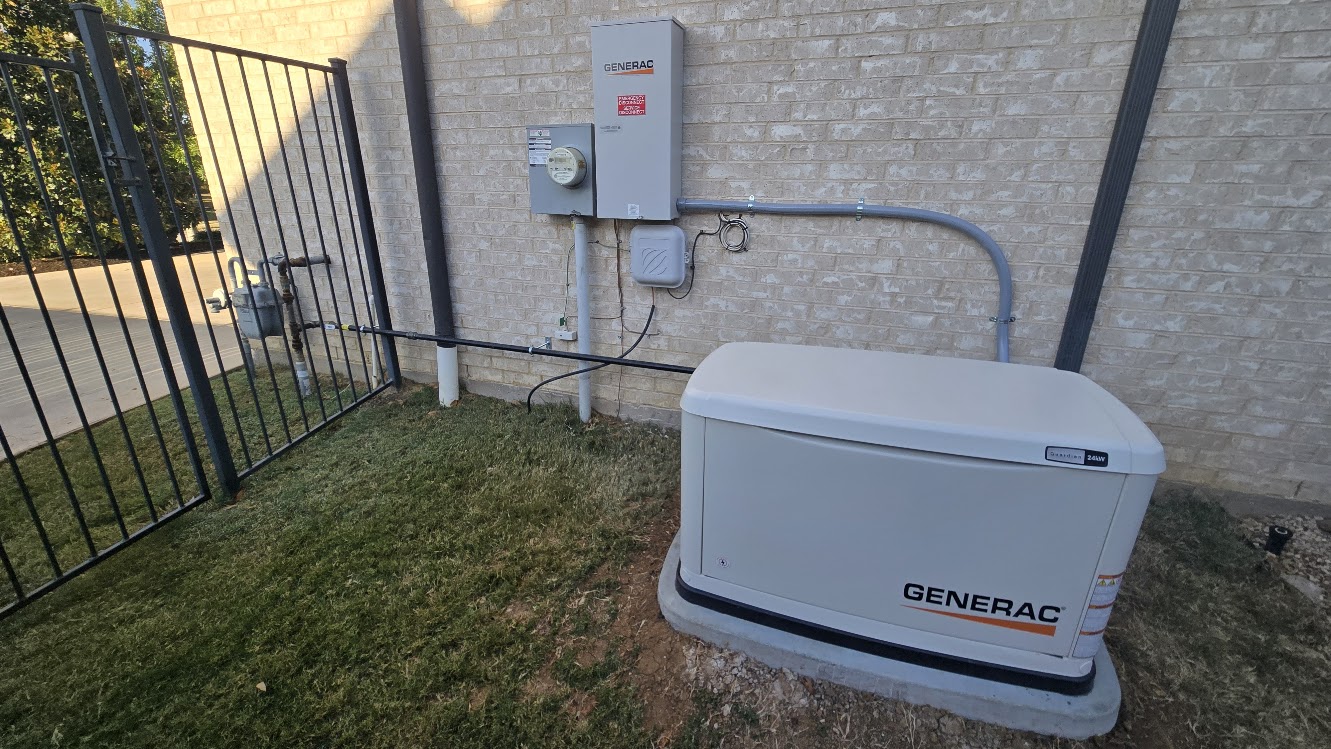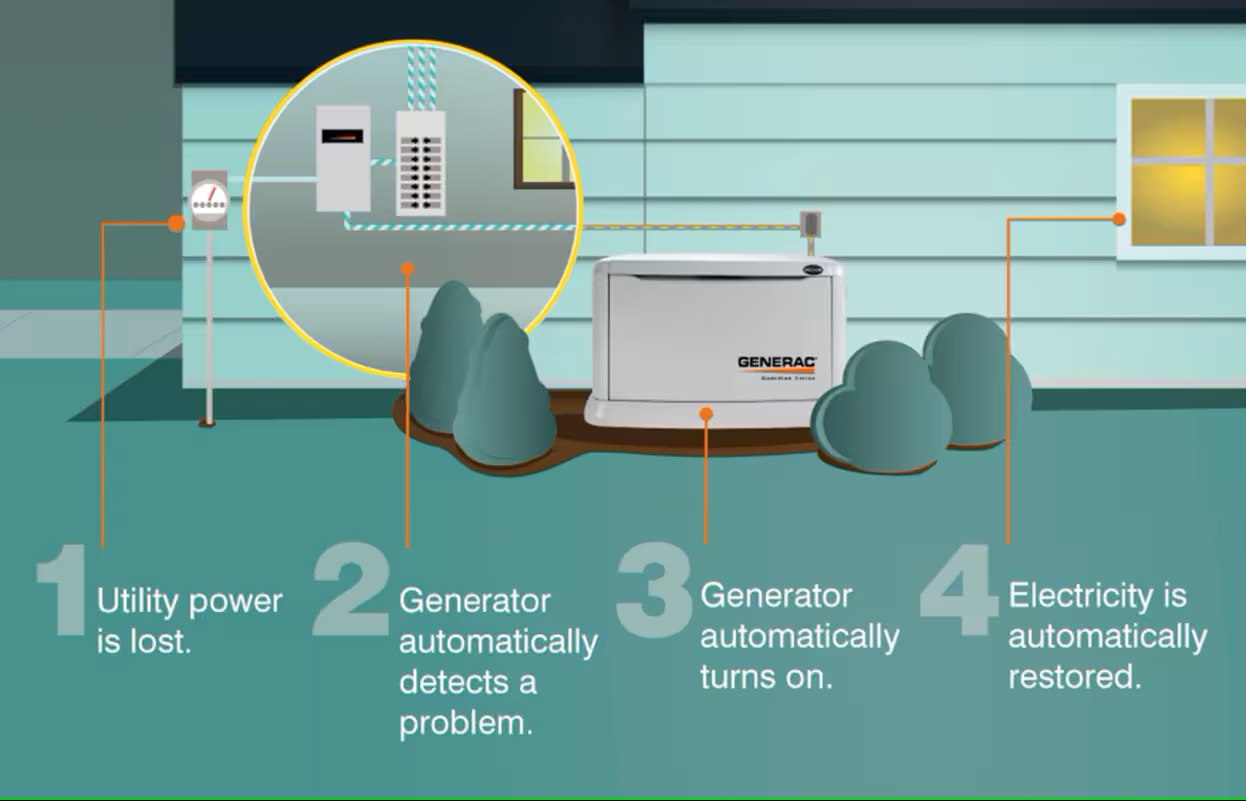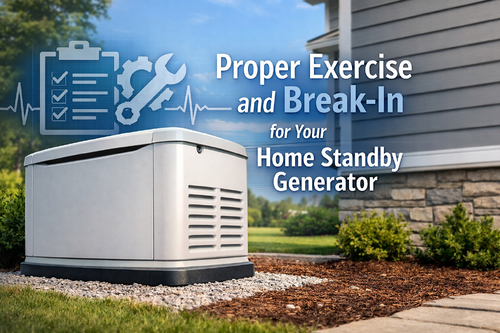A whole-home backup generator automatically detects power outages, switches your home to generator power, and keeps essential systems running using natural gas or propane. It ensures uninterrupted electricity and peace of mind during emergencies. READ MORE
Frequently Asked Questions

You have questions, we have answers
At Guardian Home Generators, we focus solely on installing dependable whole-home backup power systems using Generac generators. Installing a backup power system is a big decision, and we want you to be comfortable when you invest in the safety and comfort of you or your loved ones. If you have additional questions, please don't hesitate to contact us.
Yes, all of our whole-home generator projects are permitted with your city, and we handle the entire process. This ensures the highest quality installation, and customer protection, and ensures there are no issues with your homeowners' insurance.
If an installer ever says, "you don't need city permits, we do this all the time" RUN. This is not the installer you want to work with.
While rare, you don't want to get caught by the city for installing without a permit as this can delay your project by weeks or months as well as unexpected costs and fines. And, while also not common, having major work to your home without permits can void your homeowners insurance. READ MORE from RocketMoney
A process that used to take up to several weeks is now completed in just a few days. While many companies still rely on traditional city wait times, Guardian Home Generators was an early adopter of the Texas SB 1202 pathway. This law allows us to use certified, independent third-party experts for plan reviews and inspections, effectively clearing the municipal hurdles that cause delays for other installers. You get the same, or often higher, safety standards, but on a predictable, accelerated timeline that gets your home protected faster. Read more about how Guardian Home Generators uses TX SB 1202 to benefit you.
In Texas, an HOA cannot prevent a homeowner from installing a permanently installed whole-home standby electric generator. They can regulate its placement and appearance. For example, they may require a generator to be placed in the backyard or side yard and/or ensure it's not in plain sight to maintain the neighborhood's aesthetics.
Texas Property Code - PROP § 202.019. Standby Electric Generators:
(b) Except as provided by this section, a property owners' association may not adopt or enforce a dedicatory instrument provision that prohibits, restricts, or has the effect of prohibiting or restricting an owner from owning, operating, installing, or maintaining a permanently installed standby electric generator.
Each HOA has very unique processes. We will provide you with all of the necessary documents you will need. Please note, this is one of the top causes of delays for a project. Some HOAs only meet once per month to review requests. We'll work with you to ensure you have everything you need.
Yes, absolutely. Each Generac home backup generator we install can be configured to run on either LP (Liquid Propane) or NG (Natural Gas). During your initial consultation, we’ll review your fuel options in detail.
Please note: these are not your standard gas grill propane tanks. The most common configuration within city limits is two vertical 120-gallon propane tanks that can be placed directly next to your home. If space allows, a single horizontal 250-gallon tank may be used. READ MORE
Liquid propane has many advantages over natural gas.
From the initial complimentary consultation to the final installation and homeowner walk-through will take about two weeks. In rare cases, it may take a month. The installation process is one to three days, depending on several factors outside of our control. The permitting process and/or HOA approval (when applicable) are often what take the longest amount of time.
Based in Grapevine, TX, we proudly stay hyper-local, focusing on the surrounding communities. While we install and serve the entire Dallas–Fort Worth Metroplex, staying close to home allows us to maintain the highest quality, deliver faster service, and keep costs down — all while staying connected to the community we call home.
We love serving our neighbors in Northeast Tarrant County, including: Grapevine, Colleyville, Southlake, Trophy Club, North Richland Hills, Keller, Hurst, Euless, Bedford, Flower Mound, and adjacent communities.
There are too many factors to provide an online cost. The most common generators we install are 20kw - 26kw. The generator price is $6,839 - $7,749. Installation costs vary greatly with generator location generally being the largest factor. A typical install in a 2,500 sq ft home is generally $13,000 - $15,000.
A whole-home backup generator is slightly larger than an AC unit. The generator must be 5' from any opening on the home (operating windows/doors, soffits, or vents), it must have 3' of clearance on the front and each side, 18" behind, and 5' above. It must be at least 3' from any other appliances (AC, external water heater), electric meter, and gas meter. If propane is used, it must be 10' from the propane tank(s). Some cities allow the unit to be placed near the fence/property line; other cities (like Euless and Ft Worth) require it to be 5' from the property line. Schedule a free site evaluation today!
A generator sounds roughly like a lawn mower. Generators are very commonly located next to the garage so many homeowners will barely hear anything inside the home. Others may hear a faint and constant hum inside the home. Again, similar to someone mowing the lawn.
Featured Blogs
- Brad Nash
- October 2, 2025
- Brad Nash
- June 21, 2025
- Brad Nash
- June 7, 2025



